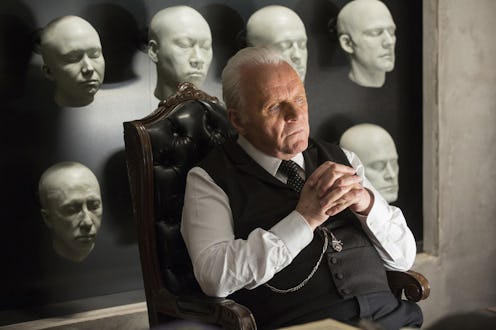
Throughout its first season, Westworld has made numerous allusions to historical works of art. We've seen characters cite both Shakespeare and the bible more than once, the opening credits mirror Da Vinci’s Vitruvian Man, and Dolores bares an uncanny resemblance to Alice from Alice in Wonderland — a story from which Bernard later asks her to recite a telling passage. But the series also has deep roots in ancient folklore, and a handful of fans have connected several convincing Westworld theories to Greek mythology.
Between the Old West setting of Westworld itself and the much more modern, very futuristic atmosphere of the corporation that runs it, the series feels temporally all over the place. When we see Ford, Bernard, and the rest of the company operating the park, they seem to be in a not-too-distant future. Yet when we follow the adventures of Dolores, William, the Man in Black and everyone else in the park, it's like we are being transported back to the Old West. But to unlock the mysteries of Westworld, we may need to look to a time that predates both of these eras by centuries. Here are some of the most compelling connections between key aspects of the futuristic HBO series and ancient Greek mythology.
Delos
In the original 1973 film that the series is based on, Westworld is actually just one of three getaways operated by a company called Delos. On HBO's Westworld, you can see the Delos logo discreetly stamped across the walls of the park's home base, so it seems that whether or not there are other parks, the company is still involved. As first noted by Redditor gaymondboofstad, Delos is also the name of a real-life island smack in the middle of the Cyclades archipelago — a venerable hotbed for Greek mythology. It’s historically known as the birthplace of Artemis and Apollo, two of the most revered Olympian deities.
According to Greece’s official tourism website, the island was later rendered sacred, meaning no mortal could be born or die there — they could only visit. This fits with the series’ premise in that the only beings that permanently inhabit West World are androids, and human guests are unable to be killed during their stays.
Ouroboros
In its broadest sense, Westworld could be a nod to the ancient Greek symbol of Ouroboros, as Reddit user ThrowsiePants9000 suggests. As described in Encyclopedia Britannica, the emblem features a snake or dragon eating its own tail, and is meant to signify an eternal cycle of destruction and recreation. It’s a concept clearly utilized in Westworld, as hosts are continuously killed off and “reborn.” The snake motif also carries over: in the original movie, a malfunctioning snake is the root of Delos’ demise, while in the HBO series, the Man in Black’s impromptu partner-in-crime has a massive snake tattoo inked across her back and face.
Dolores & Artemis
Dolores’ pure, virtuous nature has drawn quick comparisons to Artemis, the Hellenic goddess of the hunt, wilderness, childbirth, and chastity, as well as the protector of young girls. As nomsumpisces explains on Reddit, these traits connect to Dolores in a number of ways. Though she’s yet to exhibit an interest in hunting, she does delight in the wild beauty of her world. Her modest behavior also diverges sharply from her fellow female hosts’ overt sexuality, much like Artemis’ virginal ethos. Another Reddit user, Redditho24602, postulates that because Artemis assisted in the birth of her twin brother, Apollo — the god of sun, light, and prophecy, among others — she’s also a vessel for wisdom and truth, much in the way that Dolores seems to be headed towards a conscious awakening.
Teddy & Prometheus
Redditor TheShallowCurtain likened a popular image of Prometheus to a scene in the Oct. 16 episode of Westworld in which the Man in Black comes across Teddy battered, beaten, and tied to a tree. As Greek lore goes, Zeus chained Prometheus to a mountainside rock to face eternal punishment. While there, his liver was eaten daily by an eagle, only to be regenerated at night. This aligns with Teddy’s Westworld narrative, in which he’s forever burdened by an unknown source of guilt and lives out his loops in search of resolve only to be constantly rebooted.
Ford, Arnold, & The Legend Of The Labyrinth
Many viewers have theorized that Arnold, Westworld’s supposedly dead co-founder, is actually still alive, and Throwsiepants9000 links his mysterious whereabouts to the old Greek legend of the Labyrinth. As told by the Ancient History Encyclopedia, Daedalus, a skilled inventor, designed a maze for King Minos. It was made to hold the Minotaur, a hybrid of man and bull. Afterward, Minos imprisoned Daedalus and his son, Icarus, in the labyrinth to prevent them from revealing its secrets.
If you think of Arnold as Daedalus and Ford as Minos, this ties up several loose Westworld threads. First, many fans have speculated that Bernard is a host modeled after Arnold. In Greek mythology, Icarus dies during his attempted escape from the maze. If both theories hold up, this explains Bernard’s dead son. In actuality, Arnold’s son is the one who died, but the memory has been programmed into Bernard’s narrative to fit with his human inspiration. Second, it would confirm the hypothesis that Arnold is secretly locked somewhere in Westworld’s maze, whose center features a figure akin to the Vitruvian Man — a drawing famously conceived by a similarly renowned inventor, Leonardo Da Vinci. Finally, Throwsiepants9000 offers one last hint: Daedalus was also responsible for the creation of agalmata, which were statues of the gods with open eyes and movable limbs. Sounds pretty familiar to me.
Whether these references are legitimate touchstones or simply clever coincidences remains to be seen, but it's clear Westworld's backstory is just as elaborate offscreen.
Images: John P. Johnson/HBO (6)